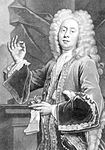| Tunbridge Wells | |
|---|---|
 The play premiered at the Dorset Gardens Theatre | |
| Written by | Thomas Rawlins |
| Date premiered | March 1678 |
| Place premiered | Dorset Garden Theatre, London |
| Original language | English |
| Genre | Restoration comedy |
| Setting | Tunbridge Wells, present day |
Tunbridge Wells; Or, A Day's Courtship is a 1678 comedy play generally attributed to the English writer Thomas Rawlins. It was originally staged at the Dorset Garden Theatre in London by the Duke's Company. The names of the original actors are not known. [1] It did not enjoy the same success as Rawlins' earlier work Tom Essence .
It takes place in the spa town Tunbridge Wells. There, a man-about-town, Owmuch, sets up a couple of London prostitutes posing as a rich widow and her maid, in the hope of collecting the courtship gifts offer by gentleman suitors. However, he sees a larger scam in tricking a foppish and idiotic baronet, Sir Lofty Vainman, into marrying her. [2]
